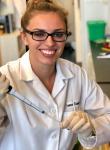Giafaglione, Jenna

Jenna is in the Cell and Developmental Biology home area of the MBIDP and joined the CMB training program in 2019. She received a B.S. in Genetics and Genomics from UC Davis.
Mentor: Dr. Andrew Goldstein, Dr. Paul Boutros
Prostate cancer is the second leading cause of cancer death in American men. In 2019, approximately 175,000 men will be diagnosed with prostate cancer and 32,000 men will succumb to the disease. At diagnosis, most prostate tumors rely on ligand-mediated androgen receptor (AR) signaling to promote cell proliferation and thus are treated via androgen deprivation therapy (ADT). ADT is typically palliative and prostate cancer cells often adapt to restore AR signaling even when androgen production is low, leading to recurrence as castration-resistant prostate cancer (CRPC). CRPC remains dependent on AR signaling and thus is treated with androgen pathway inhibitors (APIs). However, prolonged API treatment can lead to the formation of an aggressive AR-indifferent tumor with small cell and neuroendocrine features. This mechanism of resistance is seen in approximately 20-25% of patients following initial treatment with APIs and is known as treatment-induced lineage crisis. Cancers with small cell and neuroendocrine features are prone to metastasis and fail to respond to chemotherapy. Consequently, patients diagnosed with this form of prostate cancer typically succumb to the disease within one year.
Cancer cells regain lineage plasticity and opportunistically exploit it to adapt to a changing environment. In particular, tumors can sometimes evade therapy by reprogramming to a state that is no longer dependent on the targeted cellular pathway. As molecularly targeted cancer therapies improve, lineage plasticity has become an increasingly appreciated mode of resistance; however, the mechanisms underlying prostate cancer lineage plasticity have yet to be fully elucidated. While Rb1 has recently emerged as a master regulator of lineage plasticity and patient outcome, the role of other Rb family members in prostate cancer has not been explored. By combining an in vivo tumor regeneration assay, immunohistochemistry and metabolomics with bioinformatics analysis of TCGA, CpTAC and ICGC genomic datasets, I will utilize an interdisciplinary approach to study the mechanistic role of Rb family member loss in lineage plasticity and its effect on patient outcome.
Currently, there are no targeted therapies available for the treatment of neuroendocrine prostate cancer. Understanding the mechanisms underlying lineage plasticity in CRPC could enable targeting of this process to treat advanced disease. By blocking the initiation of neuroendocrine differentiation or reversing its lineage switch, we might restore tumor sensitivity to APIs.


